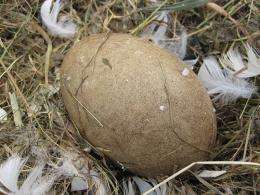Image: Flickr
(Phys.org) -- Researchers in Britain are confused by the mute swans of Abbotsbury Swannery. They lay four to ten eggs during a laying cycle which lasts generally a couple of days. During that time, they sometimes sit on the eggs laid up to that point, but not long enough to cause the eggs to begin incubation; that doesn’t start until all of the eggs have been laid. So why do they bother at all beforehand? It seems like a waste of energy, which birds as a general rule, tend to avoid. That’s what this new research aims to find out. The group have taken a real egg, sawed off one end and fitted it inside with electronics embedded in rubbery silicon.
The electronics consist of an accelerometer to measure movement, a radio signal generator, a thermometer to find out just how much heat the birds are offering to the eggs both before all are laid and after and a chip to do all the conversions. The end product is good enough to fool the swans and thereby give the researchers a way to measure what goes on with the egg, something that could not be done any other way. The egg sends data to a remote computer eight times a second, where the information is analyzed and stored.
The swannery in Abbotsbury has hosted swans, scientists believe, for over a thousand years and is unique in that it’s the only mute swan colony that is managed by humans. It’s also a tourist attraction. Because of that, the swans are used to people and don’t grow flustered and leave when they come around. The colony typically supports over 600 swans of which generally just a hundred and fifty are part of mutual pairings. Nesting swans are generally quite territorial leading to nests that are rather far apart. In Abbotsbury, that’s not possible, so the birds sometimes lose track of young as they wander into the nests of others nearby. Back in the 1500’s the swans were eaten at special events by monks from the Benedictine monastery at St. Peter's.
In addition to figuring out why the birds roost before laying all their eggs, the researchers hope to learn more about the process by which cygnets hatch in general.
More information:
via BBC
© 2012 Phys.org





















